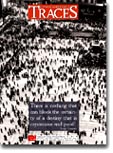
Traces N.5, May 2002
A Destiny that Is Mysterious and GoodOne of the pat phrases going around–without ever being critically examined, especially in these times–is the statement: “I envy those who have faith.” Journalists, writers, and politicians may be saying it in all sincerity, but they view the gift of faith as the good fortune of a special consolation–like having the good fortune of a remedy, a drug that alleviates the harshest and most unbearable pains.
This is one of the ways used to relegate faith to the category of phenomena that do not have anything to do with life in the immediate instant (but to life an instant later). It is as though first comes life, which normally has a certain amount of adventure and experience of limitations, and then, next, comes faith to fix it, to keep its spirits up a bit.
If this is applied to the personal sphere, how much more is it applied to the public sphere and the history of society! The world is a horrendous theater of wars and tyrannous acts, and most people hold that faith has no possibility of affecting these things in any positive, real way. When the Pope, speaking also in reference to the recent events in the Middle East or what happened on September 11th in New York, summoned everyone to take an authentically religious position in an effort to solve the problems, most people considered him “out of bounds.”
The champions of ideology have never been able to stand someone who affirms that faith can have an effect on the real of a man’s life, at any level whatsoever of his action, whether personal or public.
Admitting this would mean calling into question the presumed certainties on which the dominant thought urges people to base their lives: success, power, and well-being understood as the defense of the perimeter of one’s own tranquility. It would mean admitting that the principal position a man must assume is that of the sense of his destiny. Instead, in actuality, we breathe a general imperative: it is not important to take a position concerning destiny, concerning the meaning of life and things. What is important is something else, always something else.
It is a widespread commonplace that faith is born of fear. But it is precisely the man who feels the meaning of his existence to be hostile and distant who has to fill it up with things and relationships that might distract him from this fundamental relationship and “console” him. And the more the problem emerges, because of personal or historic circumstances, the more violent and acute is the censorship. This is why, Eliot reminds us, the Church is no longer wanted in our time. Why have anything to do with a presence that unceasingly recalls the problem of the relationship with destiny? It should be avoided and attacked, using ridicule or disgrace if necessary.
Jesus Christ entered history with an unheard-of invitation addressed to man: “Do not weep!” Life, with all its burden of limitations and pains, is not something to be wept over. This invitation is not a passing and thus cruel consolation, but the communication of a certainty: the destiny of life is happiness. This certainty coincides with the possibility of a relationship with destiny that is present, with the meaning of the world that was made man, with the truth that is finally no longer lost among conjectures and desires, but is living and is a friend.
Only the God who was made flesh–and in this flesh knew the experience of death–and who took everything that is human into the Resurrection, can be moved at the condition of men and communicate to them the certainty that life is not something vain, and because of this that “nothing can block the certainty of a destiny that is mysterious and good,” as Fr Giussani said at the close of the Spiritual Retreat of the CL Fraternity in Rimini.